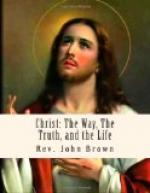dare not say, that they make any alteration in the
state of a believer; for once in a justified state
always in a justified state. It is true likewise,
that as to those sins, which now he hath committed,
he cannot be said to be acquitted or justified, till
this pardon be got out by faith and repentance, as
is said; yet his state remaineth fixed and unchanged;
so that though God should seem to deal with such in
his dispensations, as with enemies, yet really his
affections change not; he never accounteth them real
enemies; nay, love lieth at the bottom of all his
sharpest dispensations. If they forsake his law,
and walk not in his judgments; if they break his statutes
and keep not his commandments, he will visit their
transgression with the rod, and their iniquity with
stripes, nevertheless his loving-kindness will he not
utterly take from them, nor suffer his faithfulness
to fail; his covenant will he not break, nor alter
the thing that has gone out of his lips, Psalm lxxxix.
30-34. And again, though after transgressions
may waken challenges for former sins, which have been
pardoned and blotted out, and give occasions to Satan
to raise a storm in the soul, and put all in confusion,
yet really sins once pardoned cannot become again unpardoned
sins. The Lord doth not revoke his sentence, nor
alter the thing that is gone out of his mouth.
It is true likewise, that a believer, by committing
of gross sins, may come to miss the effects of God’s
favour and good will, and the intimations of his love
and kindness; and so be made to cry with David, Psalm
li. 8, “Make me to hear joy and gladness;”
and ver. 12, “Restore unto me the joy of thy
salvation,” &c. Yet that really holdeth
true, that whom he loveth he loveth to the end; and
he is a God that changeth not; and his gifts are without
repentance. Yea, though grieving of the Spirit
may bring souls under sharp throes, and pangs of the
spirit of bondage, and the terrors of God, and his
sharp errors, the poison whereof may drink up their
spirits, and so be far from the actual witnessings
of the Spirit of adoption; yet the Spirit will never
be again really a spirit of bondage unto fear, nor
deny his own work in the soul, or the soul’s
real right to, or possession of that fundamental privilege
of adoption,—I say, that the soul is no
more a son, nor within the covenant.
2. The course before mentioned is to be taken with all sins, though, (1.) They be never so heinous and gross. (2.) Though they be accompanied with never such aggravating and crying aggravations. (3.) Though they be sins frequently fallen into; and, (4.) Though they be sins many and heaped together. David’s transgression was a heinous sin, and had heinous aggravations, yea, there was an heap and a complication of sins together in that one; yet he followed this course. We find none of these kind of sins excepted in the new covenant; and where the law doth not distinguish, we ought not to distinguish; where God’s law doth not expressly exclude us, we should not exclude




